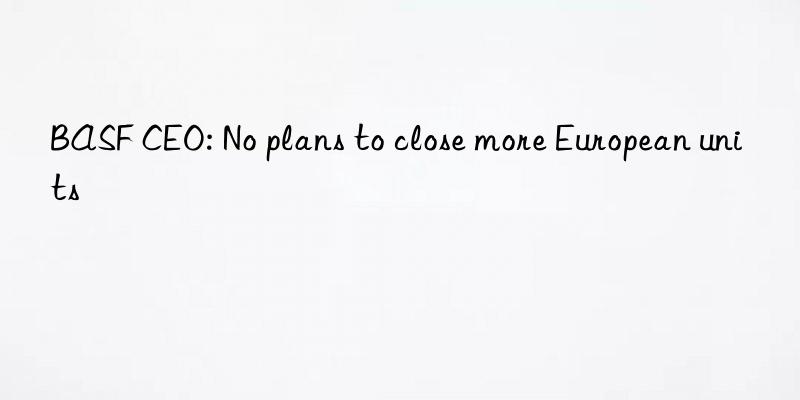
BASF CEO Martin Brudermuller recently said that after announcing earlier this year that it would shut down some plants in Europe, BASF has not Plan to shut down other devices.
Martin Brudermuller said that while Europe is in a competitive disadvantage due to low demand and high energy prices, the current move by BASF to rationalize its production layout in the region may be limited to the closures announced in February plan. And there is still value in participating in the local market. "
He said at a press conference: "BASF announced the closure of some devices, and that's all. We will not continue to close other devices."
The company announced in February this year plans to close a series of installations in Ludwigshafen, Germany, including:
- Closure of the caprolactam plant, one of the two ammonia plants and associated by-product facilities: BASF's caprolactam plant in Antwerp, Belgium, has sufficient capacity to meet future market demand in Europe. Higher value-added products, such as standard and specialty amines and the Adblue® business, will not be affected and will continue to be supplied through another ammonia plant at the Ludwigshafen site.
- Cut adipic acid production capacity, close cyclohexanol, cyclohexanone and sodium carbonate plants: the joint venture established with Domo and located in Charappe, France will continue to maintain the production of adipic acid, its capacity Sufficient to supply European business in today's changing market environment. Cyclohexanol and cyclohexanone are precursors of adipic acid; sodium carbonate plants use by-products of adipic acid production. BASF will continue to operate its polyamide 6.6 production units in Ludwigshafen, which require adipic acid as a precursor.
- Turn off TDI installations and precursor installations of DNT and TDA: Demand for TDI was very weak, especially in EMEA, much lower than expected. The TDI complex in Ludwigshafen was underutilized and fell short of expectations in terms of economic performance. This situation is further exacerbated by the dramatic increase in the cost of energy and utility services. Relying on its global production network in Geismar, Louisiana, USA, Yeosu, South Korea, and Shanghai, China, BASF will continue to provide European customers with reliable TDI products.
Martin Brudermüller says decarbonisation and maintenance costs are also factors in the selection of which installations to close, in addition to competitiveness and energy factors. It's clear that we can't just focus on future production. How much does energy cost in Europe? How competitive are we? We also have to think about how much money is going to be invested in maintaining these plants in the future, and how much is going to be invested in decarbonizing? "
He added: "Putting it all together gives us a complete picture of whether the factory is sustainable."
Despite difficult operating conditions for chemicals in Europe, especially upstream in the value chain, basic chemicals with demand potential for high-value applications remain attractive margins, prompting Luther The ammonia plant in Vichy Harbor has decided to continue operating.
He said: "If you look at basic chemicals, you will...�The situation of finding basic chemicals with no added value is going to get worse. "
He added: "It only makes sense if you can continue to use these chemicals and refine them."



 微信扫一扫打赏
微信扫一扫打赏
